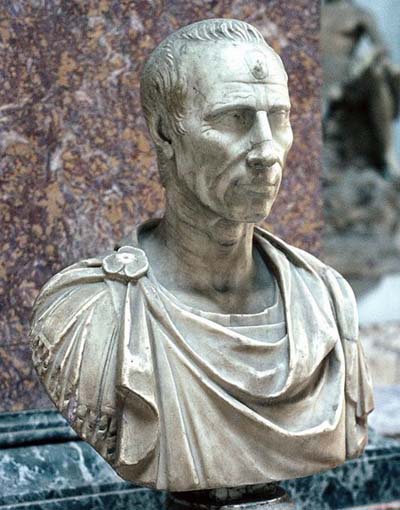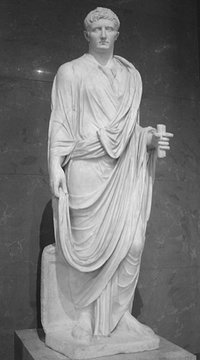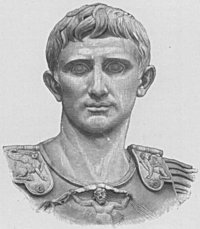

�Augustus born Gaius Octavius Thurinus and prior to 27 BC, known as Gaius Julius Caesar Octavianus after adoption, was the first emperor of the Roman Empire, who ruled from 27 BC until his death in AD 14. The young Octavius was adopted by his great uncle, Julius Caesar, and came into his inheritance after Caesar's assassination in 44 BC. In 43 BC, Octavian joined forces with Mark Antony and Marcus Aemilius Lepidus in a military dictatorship known as the Second Triumvirate. As a Triumvir, Octavian effectually ruled Rome and most of its provinces as an autocrat, seizing consular power after the deaths of the consuls Hirtius and Pansa and having himself perpetually re-elected. The Triumvirate was eventually torn apart under the competing ambitions of its rulers: Lepidus was driven into exile, and Antony committed suicide following his defeat at the Battle of Actium by the armies of Octavian in 31 BC.
After the demise of the Second Triumvirate, Octavian restored the outward facade of the Roman Republic, with governmental power vested in the Roman Senate, but in practice retained his autocratic power. It took several years to work out the exact framework by which a formally republican state could be led by a sole ruler, the result of which became known as the Roman Empire. The emperorship was never an office like the Roman dictatorship which Caesar and Sulla had held before him; indeed, he declined it when the Roman populace "entreated him to take on the dictatorship".
By law, Augustus held a collection of powers granted to him for life by the Senate, including those of tribune of the plebs and censor. He was consul until 23 BC. His substantive power stemmed from financial success and resources gained in conquest, the building of patronage relationships throughout the Empire, the loyalty of many military soldiers and veterans, the authority of the many honors granted by the Senate, and the respect of the people. Augustus' control over the majority of Rome's legions established an armed threat that could be used against the Senate, allowing him to coerce the Senate's decisions. With his ability to eliminate senatorial opposition by means of arms, the Senate became docile towards his paramount position of leadership.
The rule of Augustus initiated an era of relative peace known as the Pax Romana, or Roman peace. Despite continuous frontier wars, and one year-long civil war over the imperial succession, the Mediterranean world remained at peace for more than two centuries. Augustus expanded the boundaries of the Roman Empire, secured the Empire's borders with client states, and made peace with Parthia through diplomacy. He reformed the Roman system of taxation, developed networks of roads with an official courier system, established a standing army (and a small navy), established the Praetorian Guard, and created official police and fire-fighting forces for Rome. Much of the city was rebuilt under Augustus; and he wrote a record of his own accomplishments, known as the Res Gestae Divi Augusti, which has survived. Upon his death in AD 14, Augustus was declared a god by the Senate, to be worshipped by the Romans.
His names Augustus and Caesar were adopted by every subsequent emperor, and the month of Sextilis was officially renamed August in his honour. He was succeeded by his stepson Tiberius.
Rise to power
Augustus was born in Rome with the name Gaius Octavius Thurinus. His father, also Gaius Octavius, came from a respectable but undistinguished family of the equestrian order and was governor of Macedonia before his death in 58 BC.
More importantly, his mother Atia Balba Caesonia was the niece of Rome's greatest general and de facto ruler, Julius Caesar.
In 46 BC Caesar, who had no legitimate children, took his great-nephew soldiering in Hispania, and adopted him as his heir. By virtue of his adoption, he then assumed the name Gaius Julius Caesar. Roman tradition dictated that he also append the surname Octavianus to indicate his biological family, from which historians derive the name Octavian; no evidence exists that he ever used the name Octavianus, however.
When Caesar was assassinated in March 44 BC, his young heir was with the army at Apollonia, in what is now Albania. At the time, he was only eighteen years old, and was consistently underestimated by his rivals for power. He gathered support by emphasizing his status as heir to Caesar and took the name Gaius Julius Caesar. He crossed over to Italy and recruited an army from among Caesar's veterans.
In Rome, he found Caesar's republican assassins, Marcus Junius Brutus and Gaius Cassius, in control. After a tense standoff, he formed an uneasy alliance with Marcus Antonius (Mark Antony) and Marcus Lepidus, Caesar's principal colleagues. The three formed a junta called the Second Triumvirate, an explicit grant of special powers lasting five years and supported by law, unlike the unofficial First Triumvirate of Pompey, Caesar and Crassus.
The triumvirs then set in motion proscriptions in which three hundred senators and two thousand equites were deprived of their property and, for those who failed to escape, their lives, going beyond a simple purge of those allied with the assassins, and probably motivated by a need to raise money to pay their troops.
Antony and Octavian then marched against Brutus and Cassius, who had fled to the east. At Philippi in Macedonia, the Caesarian army was victorious and Brutus and Cassius committed suicide (42 BC). While Octavian returned to Rome, Antony went to Egypt where he allied himself with Queen Cleopatra, the ex-lover of Julius Caesar and mother of Caesar's infant son, Caesarion. The Roman dominions were then divided between Octavian in the west and Antony in the east.
Antony occupied himself with military campaigns in the east and a romantic affair with Cleopatra; Octavian built a network of allies in Rome, consolidated his power, and spread propaganda implying that Antony was becoming less than Roman because of his preoccupation with Egyptian affairs and traditions. The situation grew more and more tense, and finally, in 32 BC, Octavian declared war.
It was quickly decided: in the bay of Actium on the western coast of Greece, after Antony's men began deserting, the fleets met in a great battle in which many ships burned and thousands on both sides lost their lives. Octavian defeated his rivals who then fled to Egypt. He pursued them, and after another defeat, Antony committed suicide. Cleopatra also committed suicide after her upcoming role in Octavian's triumph was "carefully explained to her" and Caesarion, the son of Julius Caesar by Cleopatra, was "butchered without compunction".
Octavian becomes Augustus

After Actium, Octavian had his work cut out for him; years of civil war had left Rome in a state of near-lawlessness. Moreover, Rome was not prepared to accept the control of a despot. Octavian was clever. First, he disbanded his armies, and held elections. Octavian was chosen for the powerful position of consul, the highest executive office of the Republic. In 27 BC, he officially returned power to the Senate of Rome, and offered to relinquish his own military supremacy and hegemony over Egypt.
Not only did the Senate turn him down, he was also given control of Hispania, Gaul, and Syria - the provinces with the greatest number of troops. Shortly thereafter, the Senate gave him the name "Augustus". The title was associated with a religious ring in antiquity and is believed to be derived from auctoritas and the practises of augurs.
In the mindset of contemporary religious beliefs, it would have cleverly symbolized a stamp of authority over humanity that went beyond any constitutional definition of his status. Additionally, the harsh methods employed in consolidating his control meant that the change in name would also serve to separate his benign reign as emperor from his reign of terror as Octavian.These actions were highly abnormal from the Roman Senate, but this was not the same body of patricians that had murdered Caesar.
Both Antony and Octavian had purged the Senate of suspect elements and planted it with their loyal partisans. How free a hand the Senate had in these transactions, and what backroom deals were made, remain unknown.
Augustus knew that the power he needed to rule absolutely could not be derived from his Consulship, however. In 23 BC, he renounced this office in favor of two other powers. First, he was granted the power of a tribune (tribunicia potestas), which allowed him to convene the Senate at will and lay business before it.
Since the tribuneship was an office traditionally associated with the common people, this consolidated his power further. Second, he received new authority in the form of an "Imperial" power (imperium proconsulare maius, or power greater than any governor), which provided him supreme authority in all matters pertaining to territorial governance. 23 BC is the date on which Augustus is usually said to have assumed the mantle of Roman emperor. He typically used the civil title Princeps ("First Citizen"). After the death of Lepidus in 13 BC he added the title of pontifex maximus.
After Actium, Octavian had his work cut out for him; years of civil war had left Rome in a state of near-lawlessness. Moreover, Rome was not prepared to accept the control of a despot. Octavian was clever. First, he disbanded his armies, and held elections. Octavian was chosen for the powerful position of consul, the highest executive office of the Republic.
In 27 BC, he officially returned power to the Senate of Rome, and offered to relinquish his own military supremacy and hegemony over Egypt. Not only did the Senate turn him down, he was also given control of Hispania, Gaul, and Syria - the provinces with the greatest number of troops. Shortly thereafter, the Senate gave him the name "Augustus".
The title was associated with a religious ring in antiquity and is believed to be derived from auctoritas and the practises of augurs. In the mindset of contemporary religious beliefs, it would have cleverly symbolized a stamp of authority over humanity that went beyond any constitutional definition of his status.
Additionally, the harsh methods employed in consolidating his control meant that the change in name would also serve to separate his benign reign as emperor from his reign of terror as Octavian.These actions were highly abnormal from the Roman Senate, but this was not the same body of patricians that had murdered Caesar.
Both Antony and Octavian had purged the Senate of suspect elements and planted it with their loyal partisans. How free a hand the Senate had in these transactions, and what backroom deals were made, remain unknown.
Augustus knew that the power he needed to rule absolutely could not be derived from his Consulship, however.
In 23 BC, he renounced this office in favor of two other powers. First, he was granted the power of a tribune (tribunicia potestas), which allowed him to convene the Senate at will and lay business before it. Since the tribuneship was an office traditionally associated with the common people, this consolidated his power further.
Second, he received new authority in the form of an "Imperial" power (imperium proconsulare maius, or power greater than any governor), which provided him supreme authority in all matters pertaining to territorial governance.
23 BC is the date on which Augustus is usually said to have assumed the mantle of Roman emperor. He typically used the civil title Princeps ("First Citizen"). After the death of Lepidus in 13 BC he added the title of pontifex maximus.
Reign
Having gained power by means of great audacity, Augustus ruled with great prudence. In exchange for near absolute power, he gave Rome 40 years of civic peace and increasing prosperity, celebrated in history as the Pax Romana, or Roman Peace. He created Rome's first permanent army and navy and stationed the legions along the Empire's borders, where they could not meddle in politics. A special unit, the Praetorian Guard, garrisoned Rome and protected the Emperor's person. He also reformed Rome's finance and tax systems.
Augustus waged no major wars. A war in the mountains of northern Hispania from 26 BC to 19 BC finally resulted in that territory's conquest. After Gallic raids, the Alpine territories were conquered. Rome's borders were advanced to the natural frontier of the Danube, and the province of Galatia was occupied. Further west, an attempt to advance into Germany ended with the defeat at the Battle of the Teutoburg Forest in AD 9.
Thereafter Augustus and his successors accepted the Rhine as the Empire's permanent border. In the east, he satisfied himself with establishing Roman control over Armenia and the Transcaucasus. He left the Parthian Empire alone maintaining generally good relations with them.In domestic matters, Augustus channeled the enormous wealth brought in from the Empire to keeping the army happy with generous payments, and keeping the citizens of Rome happy by beautifying the capital and staging magnificent games. He famously boasted that he "found Rome brick and left it marble".
He built the Senate a new home, the Curia, and built temples to Apollo and the Divine Julius. He also built a shrine near the Circus Maximus. The Capitoline Temple and the Theater of Pompey are recorded as projects of Augustus, whose name was deliberately uncredited. He founded a ministry of transport that built an extensive network of roads - enabling improved communication, trade, and mail. Augustus also founded the world's first fire brigade, and created a regular police force for Rome.
Succession
Augustus' control of power throughout the Empire was so absolute that it allowed him to name his successor, a custom that had been abandoned and derided in Rome since the foundation of the Republic. At first, indications pointed toward his sister's son Marcellus, who had been married to Augustus' daughter Julia Caesaris.
However, Marcellus died of food poisoning in 23 BC. Reports of later historians that this poisoning, and other later deaths, were caused by Augustus' wife Livia Drusilla are inconclusive at best.After the death of Marcellus, Augustus married his daughter to his right hand man, Marcus Agrippa.
This union produced five children, three sons and two daughters: Gaius Caesar, Lucius Caesar, Vipsania Julia, Agrippina the Elder, and Postumus Agrippa, so named because he was born after Marcus Agrippa died. Augustus' intent to make the first two children his heirs was apparent when he adopted them as his own children.
Augustus also showed favor to his stepsons, Livia's children from her first marriage, Nero Claudius Drusus Germanicus and Tiberius Claudius, after they had conquered a large portion of Germany.After Agrippa died in 12 BC, Livia's son Tiberius divorced his own wife and married Agrippa's widow.
Tiberius shared in Augustus' tribune powers, but shortly thereafter went into retirement. After the early deaths of both Gaius and Lucius in AD 4 and AD 2 respectively, and the earlier death of his brother Drusus (9 BC), Tiberius was recalled to Rome, where he was adopted by Augustus.
On August 19, AD 14, Augustus died. Postumus Agrippa and Tiberius had been named co-heirs. However, Postumus had been banished, and was put to death around the same time. Who ordered his death is unknown, but the way was clear for Tiberius to assume the same powers that his stepfather had.
Augustus' Legacy

Augustus was deified soon after his death, and both his borrowed surname, Caesar, and his title Augustus became the permanent titles of the rulers of Rome for the next 400 years, and were still in use at Constantinople fourteen centuries after his death. The derived titles Kaiser and Tsar would be used until the early part of the 20th century.
The cult of the Divine Augustus continued until the State Religion of the Empire was changed to Christianity in the 4th century. Consequently, we have many excellent statues and busts of the first, and in some ways the greatest, of the Emperors. Augustus' mausoleum also originally contained bronze pillars inscribed with a record of his life, the Res Gestae Divi Augusti.
Many consider Augustus as Rome's greatest emperor; his policies certainly extended the empire's life span and initiated the celebrated Pax Romana or Pax Augusta. He was handsome, intelligent, decisive, and a shrewd politician, but he was not perhaps as charismatic as Julius Caesar or Marc Antony; as a result, Augustus is not as renowned as either man, and is often confused with Julius Caesar.
Nevertheless, his legacy proved more enduring.The month of August (Latin Augustus) is named after Augustus; until his time it was called Sextilis.In looking back on the reign of Augustus and its legacy to the Roman world, its longevity should not be overlooked as a key factor in its success.
People were born and reached middle age without knowing any form of government other than the Principate. Had Augustus died earlier (in 23 BC, for instance), matters may have turned out differently. The attrition of the civil wars on the old Republican oligarchy and the longevity of Augustus, therefore, must be seen as major contributing factors in the transformation of the Roman state into a monarchy in these years. Augustus' own experience, his patience, his tact, and his political acumen also played their parts.
He directed the future of the empire down many lasting paths, from the existence of a standing professional army stationed at or near the frontiers, to the dynastic principle so often employed in the imperial succession, to the embellishment of the capital at the emperor's expense. Augustus' ultimate legacy was the peace and prosperity the empire enjoyed for the next two centuries under the system he initiated.
His memory was enshrined in the political ethos of the Imperial age as a paradigm of the good emperor, and although every emperor adopted his name, Caesar Augustus, only a handful earned genuine comparison with him (Trajan). His reign laid the foundations of a regime that lasted for 250 years.
Augustus was ranked #18 on Michael H. Hart's list of the most influential figures in history.
ANCIENT AND LOST CIVILIZATIONS
ALPHABETICAL INDEX OF ALL FILES